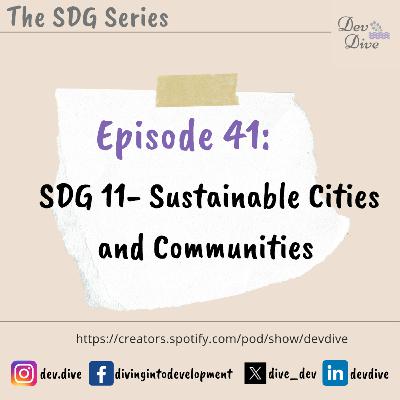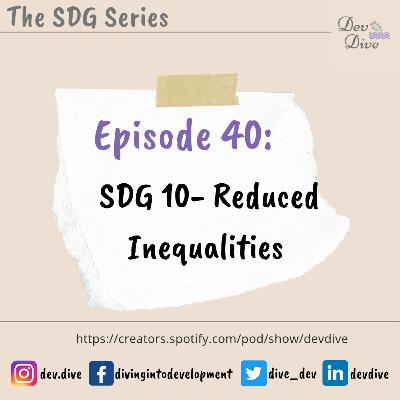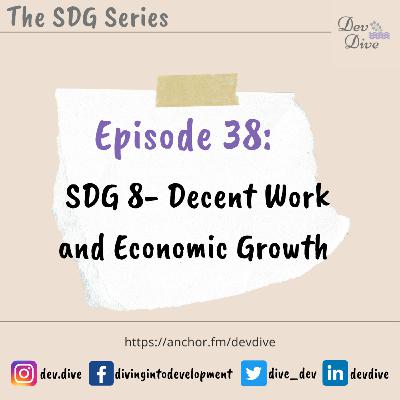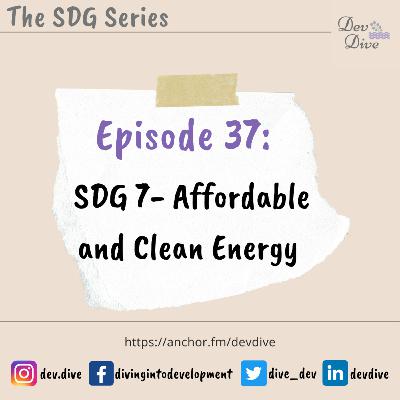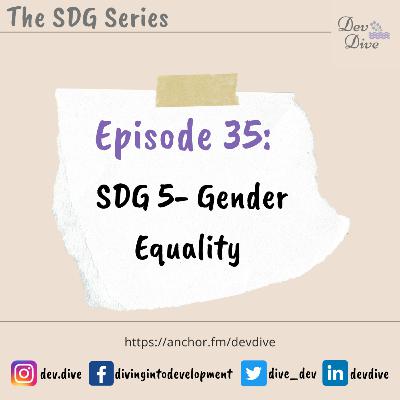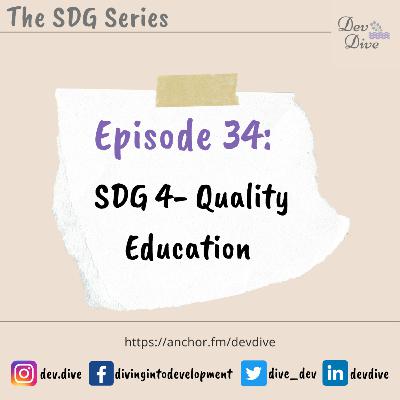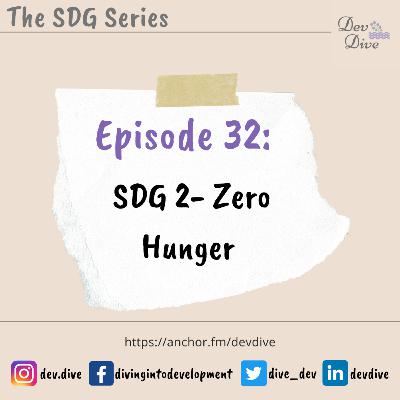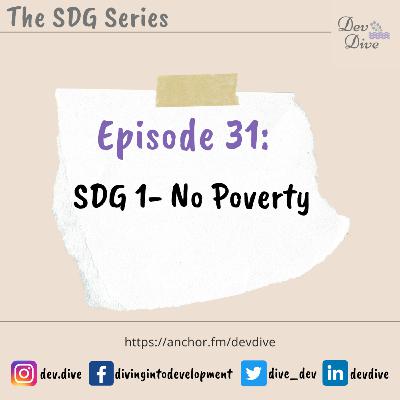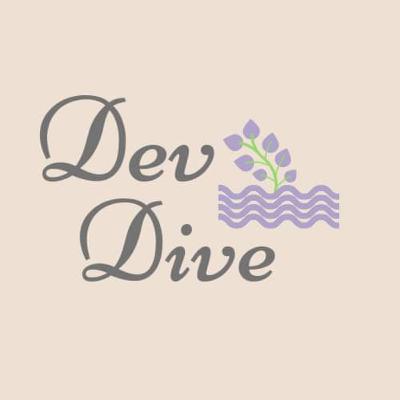Discover DevDive
DevDive

42 Episodes
Reverse
In conversation with Mika Mei Jia Tan on #SDG11- Sustainable Cities and Communities. Mika is the Co-Founder and Lead for East and Southeast Asia at the Urban Biodiversity Hub (UBHub), developing tools and guidance to enable local governments to plan with nature. She has been building capacity and tools for non-state actors to participate meaningfully in biodiversity governance and action for the past 15 years. An interdisciplinary thinker, Mika holds a B.A. in Environmental Studies (Conservation Biology) from Middlebury College, USA, and is an inaugural Middlebury Social Entrepreneurship Fellow. In this episode, we talk about climate change, its impact on cities and people, and explore how cities can be made more sustainable. We hear Mika's vision for UBHub and her work with young leaders. We also discuss how biodiversity governance and sustainability can be prioritised along with economic growth.
In conversation with Harshita Sinha, PhD Candidate in the Department of International Development at the London School of Economics and Political Science. Her doctoral research focuses on Internal migrant workers access to welfare and social rights in the Indian Informal Economy. In this episode of the SDG series, we talk about SDG 10 targets, and focus on the challenges surrounding equitable migration policies and practice. We talk about the role of state and non-state actors, and the critical role that people play in promoting equal and inclusive spaces in areas where migrants move. We also talk about the relationship between migration and socio-economic mobility, and how one does not necessarily lead to the other. Finally, we listen to Harshita's D-Dream.
In conversation with Dr. Aderinsola Adio-Adepoju, an educator, coach, academic, entrepreneur, SDGs, and global opportunities expert. She is the founder of I-Train Africa, an Edtech social enterprise, and is working towards cultivating a generation of African youths armed with the knowledge, skills, and direction to shape a promising future.
In this episode of DevDive, we speak about SDGs and how they are connected to people and their lived realities. We delve into SDG 8 and try and unpack what is meant by decent work and economic growth. We learn about I-Train Africa and the interconnections between SDG 4 and 8, and talk about an inclusive approach to the goals. We also hear about Dr. Aderinsola's d-dream.
In conversation with Shayna Vayser, Low Income Program Manager at the DC Sustainable Energy Utility (DCSEU), where she leads the investment of millions of dollars in energy efficiency upgrades for affordable housing across the District of Columbia. Her work at the intersection of emerging technology, equity, and sustainability includes serving as a Web3 Advisory Board Member at Salesforce, as well as the Senior Policy Advisor on Sustainable Development at the United Nations Association of the National Capital Area (UNA-NCA). In her role at UNA-NCA, Shayna leads the design, implementation, and evaluation of the Global Goals at Home program, which localizes the UN Sustainable Development Goals (SDG) in order to establish a proxy framework for data collection and analysis on sustainable development across DC, MD, and VA. Shayna earned her MA in International Relations from American University.
In this episode of DevDive, we delve into SDG 7 through Shayna's journey in the energy sector. We talk about the targets and challenges of the goal, the need to balance localisation with global targets, and the importance of collecting and using data effectively. We also discuss the relationship between energy and climate change.
In conversation with Aanya Wig, Co-Founder of Girl Up Rise (now Her Haq). Aanya is a recent graduate from Lady Shri Ram College for Women, University of Delhi and a SUSI scholar, being one of the four girls nominated to represent India for a women's leadership fellowship with the US Department of State. She is the Co-Founder of Girl Up Rise, a youth-led collective working towards creating a world where no woman has to fight to make her voice heard. Aanya is also Programme Associate at Circle In, working on empowering women economically. She is also on the Young People’s Action team for UNICEF working towards empowering young people.
In this episode we talk about Aanya's early experiences that led her to work towards gender equality, her work on women's agency and their empowerment, and how she defines women's leadership. We also delve into the gendered impact of the pandemic and the way forward towards a more inclusive, equal world.
In conversation with Oroma Kenneth, CEO and Co-Founder of EduBall- a community-based organization that uses the power of football to improve academic outcomes for children in underprivileged societies. He also leads Literacy Beyond Boundaries, a team of young writers that writes age, content and reading level appropriate books for children much older than the classes in which they are and are struggling with reading. Kenneth also co-leads the Teach For All community in Uganda which brings together teachers providing access to quality education in emergency settings.
In this episode of DevDive, the fourth of our series on the Sustainable Development Goals, we speak to Oroma about his growing up days in an Internally Displaced Camp and later attaining a higher education because his teachers believed in his abilities even in such situations. We also listen to his inspiring journey that led him to find his purpose in Education an his time at a rural primary school for two years under the Teach For Uganda fellowship program where he contributed to the reduction in school dropout levels from 16 in 33 children to 3 in 33 children and was awarded the distinguished fellow award for achieving high community and school impact. We speak about the potentially powerful role sports can play in bringing children to school and enhancing their learning.
In conversation with Onome Ako, Chief Executive Officer (CEO) of Action Against Hunger Canada, an international humanitarian organization that fights hunger and its root causes worldwide. She has led initiatives in more than 20 countries with organizations including Amref Health Africa, World Vision Canada, AfricaRecruit (a program of the Commonwealth) and UNESCO-Regional Bureau for Education. She has an M.Sc. in Management of NGOs and Social Policy from the London School of Economics.She was named to the 2020 Canadian Women in Global Health list. She was also recognized as one of 2021 Canada’s Most Powerful Women: Top 100 Award, which spans the private, public and not-for-profit sectors and recognizes outstanding women across Canada.
In this episode, the second of our series on the SDGs, we speak to Onome about her work in addressing hunger and food insecurity. She shares her parents' efforts in helping the community around them get access to clean and safe drinking water, her journey in the development space, and her vision for Action Against Hunger. We also discuss the impact of covid-19 on global hunger, and what can be done by governments, organisations, communities, and individuals.
Welcome to the first episode of our new series on the United Nations Sustainable Development Goals. For the next 17 episodes, we shall be diving into each of the goals, profiling individuals and organisations and learning about their work.
In the first episode of the SDG series, we look at SDG 1- End Poverty in all its forms everywhere. In conversation with Professor Santiago Fiorio Vaesken, Head of Global Partnerships at Poverty Stoplight, which aims to eliminate poverty from a multidimensional perspective. Based out of Paraguay, he is an elected member of the United Nations Committee on Economic, Social and Cultural Rights and a university professor in international relations. He has a Masters degree in Human Rights from the London School of Economics and Political Science. Santiago is a specialist in human rights, international humanitarian law and international cooperation, with experience in humanitarian assistance, risk management and international relations.
In this episode, we discuss the vision, mission, and approach of Poverty Stoplight, how can interventions targeted at poverty elimination be made sustainable, working with multiple stakeholders, the impact of the pandemic that pushed an additional 119-124 million people back into extreme poverty in 2020 potential strategies to reverse the trend. We also talk about a human rights approach to poverty elimination, and whether we need to revisit target 2030. We conclude by hearing about Prof. Santiago's D-Dream.
You can reach out to the team at Poverty Stoplight via- LinkedIn (https://www.linkedin.com/company/poverty-stoplight/) and Instagram (@povertystoplight). Their website is https://www.povertystoplight.org/.
New series where we profile an organisation making a difference in the development space, one changemaking initiative at a time.
Featured in this episode- Connecting Dreams Foundation. Connecting Dreams Foundation works to create change-makers through a learning model carefully curated for the youth with innate capabilities, through different training programs for different ages like the Global Changemakers Fellowship, the Bootcamps, and college labs. The whole learning is based upon a 3C model which is Collect-Create-Change. The whole model is not idea-centric; but community-centric. It helps the changemaker in identifying the people's problems and then create sustainable solutions for the same. In conversation with Sheetal, Associate Director- Youth Engagement at Connecting Dreams Foundation. She engages with global changemakers to support them to create sustainable business models and communities by localizing UN SDGs. A-One Future Collective Fellow 2019, Sheetal has co-founded initiatives on menstrual hygiene management and women empowerment.
In conversation with Gayatri Buragohain, Founder and Executive Director of Feminist Approach to Technology (FAT), a non-profit based in India. FAT is dedicated to enabling access to technology and STEM education as well as support leadership building of disadvantaged adolescent girls and young women. An electronics engineer by education, FAT combines Gayatri’s technological background with her passion for working towards a gender just society. Although Gayatri has been working primarily towards building FAT since 2007, she has also run a tech enterprise called Joint Leap Technologies (2008 to 2013), served as the ACM-W Ambassador in India (2010 to 2011) and served as the Executive Director of Foundation for Social Transformation (FST) in North East of India (2013 to 2016) in between this period.
In this episode, Gayatri speaks to us about her journey that led her to set up Feminist Approach to Technology to now leading its transition to become a community led organisation adopting a new collective leadership structure, and her next D-dream.
In conversation with Carl Duff on his experience of working with students across different countries, designing teaching learning materials, and wanting to use video games as a learning tool. Carl is a former teacher from Boston, Massachusetts. He recently graduated from the Harvard Graduate School of Education and is moving to Bengaluru, India to work in the EdTech space.
In conversation with Laura Wamprecht, Managing Director at Flying Health, Germany. Flying Health is a subsidiary of Eternity.Health, a European Life Science Technology Holding that aims to unite the strengths of science, practical medicine, and entrepreneurship. At Flying Health, Laura oversees the Partnership Program, which defines the framework for collaboration with partner companies. She is a biochemist and joined Flying Health as the first employee in 2015. Through close collaboration with the leading players in the healthcare industry and the startup-world in Europe, she developed & accompanied numerous market entry strategies for digital health products.
In this episode, she speaks to us about her journey in the healthcare space, how the role of the public and private sector in digital health has evolved over the years, impact of covid-19 on digital health, and the future of healthcare.
In this episode, we- Anushna and Mehrin- are in a freewheeling conversation with each other about our development journeys, seasons 1 and 2 of DevDive, feminism, and our D-Dreams.
In conversation with Simon Jeffrey, Policy Officer at Centre for Cities, UK. While overseeing the broader policy agenda, Simon is the policy lead on devolution and transport. He focuses on the introduction and development of metro mayors and how cities can improve urban mobility to support more jobs, more housing and higher wages. Simon joined Centre for Cities in 2013, originally working on the Centre’s events programme. He previously worked at the think tank Progress and has a degree in Politics at the University of York.
In this episode, he speaks to us about his interest in politics and processes, moving from the events to the policy team of his organisation and future plans. We also discuss the impact of covid-19 on urban transport and mobility and its long-term impact on the sector.
In conversation with Kruti Munot, Project Manager at GIZ where she works with local governments in Africa on issues of climate change and urban development. She is a postgraduate in Environment and Development from the London School of Economics and Political Science, and holds a Bachelor’s degree in Business and Environmental Science. Based in Brussels, her interests lie in urban development, circular economy, and the role of financial institutions in driving sustainable development.
In this episode, she speaks to us about her interest in urban development, cities, and sustainability, her work in India, Europe, and Africa, and her plans to find and highlight interlinkages among sectors.
In conversation with Masachs Boungou, a fourth-year doctoral student in Global Studies Program at the University of Massachusetts Lowell, where he is developing his dissertation around a model of business entrepreneurial action that takes its point of departure in the entrepreneur’ personal disturbing experience and the role of the sensemaking associated to that personal disturbing experience. Prior to that, he majored in a dual masters’ degree in Sustainable International Development and Conflict Studies at Brandeis University, where he held a Fulbright Fellowship and founded the Brandeis University Fulbright Chapter. After his Fulbright Fellowship, he founded a Nunga Program, a social nonprofit organization for youth empowerment in Brazzaville, Congo. Masachs is recipient of the Award Grant for Social Change, the Pollination Project, 2020 and the New Leaders Group Award by the Institute of International Education (IIE) in 2018.
In this episode, he speaks to us about his growing up years, Fulbright experience, the process of applying for a PhD, and his future goals. About why the doctoral degree holds value both at a personal and family level, and words from his grandfather that inspire him.
In conversation with Abhilash Puljal, a trained social scientist, a trade strategy and private sector development specialist and a certified management consultant. He has close to two decades of experience advising public and private sectors, multilaterals and industry associations in conceptualising and implementing sustainable ventures, developing business strategies, interpreting and advising on policy and regulatory matters across agriculture, renewable energy, healthcare and education verticals. He is passionate about developmental issues affecting the Global South.
In this episode, he speaks to us about his growing up years, interest in numismatics and history, and his academic and professional experiences. About studying in the US, Australia, Russia, and the UK, and the takeaways during in the course of this journey. Also about how working in the development sector enables interactions with diverse peoples and communities, and the one skill that comes handy.
In the first episode of the new year and our new series on careers in development, we are in conversation with Nauraiz Rana. Nauraiz is a development economist who works with the World Bank Group. He currently works on gender and economic inclusion for under-served groups in emerging markets. In addition to the world bank he has also worked for the United Nations Development Program, for the Government of Punjab (Pakistan) and the Ontario Ministry of Economic Development undertaking development-oriented roles. His focus areas include private sector development, gender mainstreaming, and financial inclusion. Nauraiz holds a dual Master’s degree in Economic Development and Policy for the London School of Economics and Political Science and Columbia University.
In this episode, he speaks to us about his intent to work in the development space early on, how he made the most of the opportunities of studying in two of the world's best educational institutions, and how he carved a niche in the wide world that development is. He speaks about the importance of field exposure and having an understanding of ground realities, and how evidence-based policies are the need of the hour. He also shares his views on gender inclusion and equality and why it is critical to all development goals.
In conversation with Mr. Hashmatullah Hayat, Assistant Director at Aschiana based in Afghanistan. Aschiana (“nest” in Dari Farsi) was founded in 1995 to help war affected children and children working on the streets in Kabul, Afghanistan. Mr. Hayat has worked in the sector for more than 13 years. Since the outbreak of covid-19, he has been responsible for distribution of ration, food and sanitisation materials and masks which has benefited more than 15,000 families.
In this episode, he speaks to us about his organisation’s initial response to covid, how they started relief work, the trajectory of the pandemic and their response mechanism, and why social distancing would be more prudent than complete lockdown.
In conversation with Rogier Jansen, a private equity investment analyst based in London. His organisation focuses on care quality and care outcomes to service users. Rogier holds a Masters degree in Health Economics from The London School of Economics and Political Science and a Bachelors degree in Finance and Economics from the University of Amsterdam.
In this episode, he speaks to us about his journey in the healthcare sector, what private equity in healthcare means, and how the healthcare market interact with health policies, and how the public and private sectors partner to provide healthcare services. He also shared some insights on the impact of the pandemic on opportunities of PPPs in healthcare.


